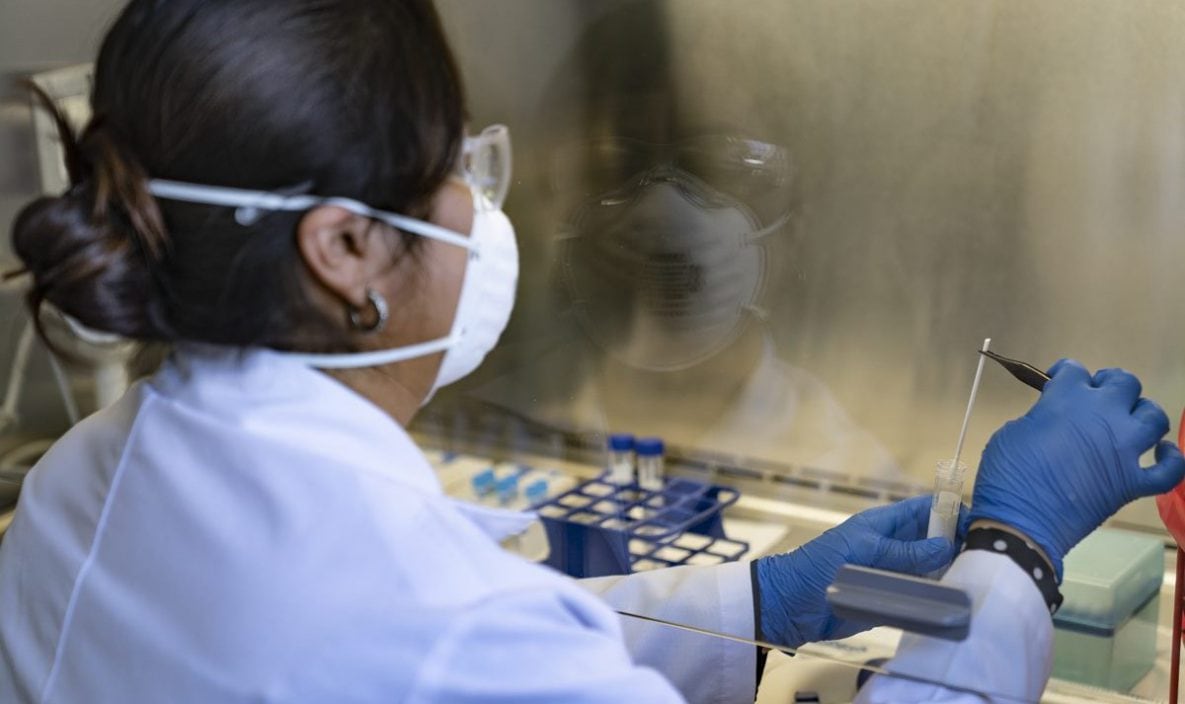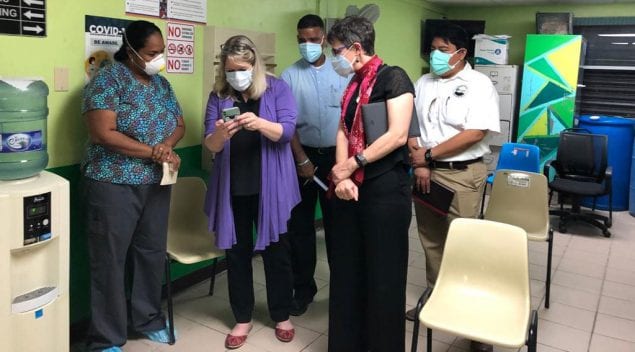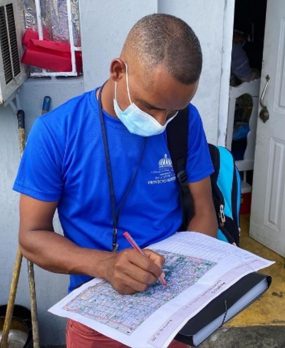CDC Leverages Acute Febrile Illness Surveillance System to Respond to COVID-19
February 15, 2022

Preparing respiratory samples for testing by a laboratory technician in Guatemala. Photo: Nicholas Tenorio/CDC
To better understand, detect, and respond to emerging and reemerging infectious disease threats, the U.S. Centers for Disease Control and Prevention (CDC) is supporting acute febrile illness (AFI) surveillance in over 20 countries across the globe. AFI is characterized by a rapid onset of fever and other symptoms such as headache, diarrhea, chills, and cough and can be caused by viruses, bacteria, parasites, and fungi. AFI surveillance with laboratory confirmation can help better define the cause of illness and identify new diseases that were previously not recognized in a country or region. It also strengthens public health responses to these threats, reduces the spread of diseases within countries and across borders, and increases health protection for the affected populations. AFI surveillance is key in supporting CDC’s work to advance global health security.
Conducting AFI surveillance leads to greater detection of emerging and epidemic-prone infectious diseases that may be unknown, understudied, or difficult to track. Additionally, surveillance systems can support high-priority investigations using available staff, material, supplies, reagents, and testing processes. During the COVID-19 pandemic, CDC leveraged existing AFI surveillance platforms to integrate testing for the virus that causes COVID-19, SARS-CoV-2, in many countries to help address the pandemic response. The adapted surveillance systems inform the key actions needed to reduce transmission and increases the scientific knowledge about COVID-19 and any similar illnesses that might emerge in the future. In response to the COVID-19 pandemic, CDC created a Global AFI Surveillance Virtual Community of Practice and hosted meetings for AFI partners across the globe to regularly meet, exchange information, and share best practices.
Since 2018, CDC experts from the Division of Global Health Protection (DGHP) in Atlanta, ministries of health (Belize, Dominican Republic, El Salvador, and Guatemala), and partner universities have been working with the CDC Central America Regional office (CAR) to develop a coordinated, regional AFI surveillance network in Central America and the Dominican Republic. CDC and la Universidad del Valle de Guatemala have over 30 years of infectious disease surveillance history in Guatemala. The network was expanded in 2018 when Baylor College of Medicine (Belize) and Brigham and Women’s Hospital (Dominican Republic) were added as new AFI surveillance partners. Through training, technical assistance, and the procurement of equipment and supplies, this regional partnership aims to build public health capacity and translate research into public health policy and actions.

Kristy Murray, Principal Investigator from Baylor College of Medicine, Emily Zielinski-Gutierrez CDC-CAR Regional Director, Dr Russell Manzanero, lead epidemiologist for Belize and AFI Surveillance site staff in Belize City, Belize are checking the data at one of the collection sites in Belize. Photo: Gerhaldine Morazan/Medical Laboratory Services at Ministry of Health Belize
The healthcare facility-based AFI surveillance in Belize, led by Baylor College of Medicine, has enrolled over 3,000 participants across its 11 hospital and clinic sites since 2020 (as of December 31, 2021). The AFI surveillance platform tests for over 50 different disease-causing pathogens and has identified the parasite Trypanosoma cruzi, which causes Chagas disease, as well as Zika virus, rickettsia, respiratory syncytial virus, rotavirus, SARS-CoV-2, and other pathogens. Rapid laboratory identification and notification to local and national health authorities ensured that Belize’s Ministry of Health was alerted to these infectious disease threats and provided with key information. Baylor College of Medicine has worked with Belize’s Ministry of Health to establish local SARS-CoV-2 sequencing capacity to respond to the COVID-19 pandemic. Given the success of the Belize AFI surveillance project, CDC and Baylor College of Medicine are planning to launch an AFI surveillance site in El Salvador in early 2022.
In the Dominican Republic, the hospital-based AFI surveillance, led by Brigham and Women’s Hospital, has enrolled almost 1,800 participants since 2019 (as of December 16, 2021). The AFI surveillance tests for six pathogens (influenza viruses, dengue viruses, chikungunya virus, Zika virus, Leptospira, and SARS-CoV-2). Leptospira testing by polymerase chain reaction (PCR) was a new diagnostic capacity introduced at the national laboratory in the Dominican Republic. The existing AFI surveillance platform was critical in supporting the early diagnostic testing of SARS-CoV-2 at the National Public Health Laboratory Dr. Defilló (Laboratorio Nacional de Salud Publica Dr. Defilló).
“Creating a regional AFI surveillance network has proven to be a unique opportunity to collaboratively advance public health in the region. Our AFI surveillance infrastructure has been a valuable resource enabling CDC to support countries in Central America and the Dominican Republic in their COVID-19 response. And AFI surveillance can be used once again to investigate and respond to the next emerging or re-emerging threat in our region.”
– Dr. Emily Zielinski-Gutierrez, Director, CDC Central America Regional Office, Division of Global Health Protection

An AFI surveillance project staff member, Dr. Obispo Lebron (Ministry of Public Health – Dominican Republic) uses a field map in the Dominican Republic as part of a field visit for the AFI surveillance project. Photo: Michael de St Aubin/Harvard Humanitarian Initiative
DGHP has leveraged ongoing acute febrile illness (AFI) surveillance activities to respond to COVID-19. These efforts enhance the ability of countries to monitor community spread and COVID-19 activity intensity in an efficient and cost-effective way by using resources and existing infrastructure already in place.
CDC’s AFI surveillance network in Central America and the Dominican Republic has combatted emerging disease threats, strengthened collaborations, and improved regional capacity for disease surveillance. Continued investment in AFI surveillance in Central America and the Dominican Republic can help reduce the spread of diseases within countries and across borders, improving the ability to detect disease threats before they happen. The successful adaptation of the AFI network has led to a greater understanding of new and potential disease threats and better characterization of risk factors and patterns of disease transmission. It has also enhanced responses to COVID-19 and increased health protection for populations in Central America and the Dominican Republic.